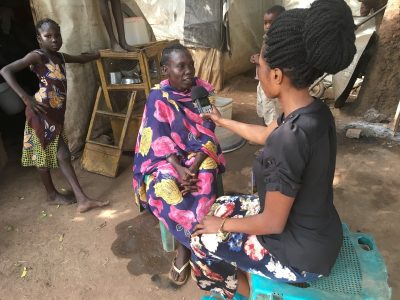Notice:
This event occurs in the past.
Putting Refugee Women and Girls’ Rights into Headlines in Conflict Zones
Friday, March 8, 2019 from 3:30 pm to 6:00 pm
- In-person event
- Room 482 (Discovery Centre), MacOdrum Library, Carleton University
- 1125 Colonel By Drive, Ottawa, ON, K1S 5B6

This International Women’s Day, March 8th, Journalists for Human Rights and LERRN (The Local Engagement Refugee Research Network) warmly invite you to Putting Refugee Women and Girls’ Rights into Headlines in Conflict Zones – a panel discussion on why media matters for refugee women and girls, and what can happen when refugee women and girls have strong platforms through media to voice their concerns and find redress.
In particular, you’ll hear how local knowledge and perspectives, amplified through media development, can enrich efforts to ensure protection and solutions with and for the world’s most vulnerable victims of conflict.
Program and Speakers:
- Journalists for Human Rights’ Executive Director Rachel Pulfer will introduce the panel and moderate.
- Nimo Bokore, Assistant Professor of Social Work at Carleton University, will speak on her experiences researching the needs of women and girls in refugee situations. She will also discuss the LERRN initiative and the importance of localizing knowledge to support protection and solutions, with and for refugees;
- Journalists for Human Rights’ Senior Programs Manager Zein Almoghraby will speak about the work JHR has done for women and girls in refugee situations and conflict zones
- Award-winning journalist Michael Petrou will speak from his experiences covering Syrian refugees across the Middle East.
Friday
March 8 3:30- 5PM
Discovery Centre, Room 482, MacOdrum Library, Carleton University, Ottawa.
(Building ML on this map: https://carleton.ca/campus/map/). Pay parking available in P1 behind the Library
Women and girl refugees are among the world’s most vulnerable people, whether they are fleeing their homes or living in refugee camps or informal settlements. While we know a lot about their needs, journalists, humanitarian workers, and development practitioners often fail to engage their voices directly in real-time, real-life scenarios, both in coverage of their situation and in programming designed to help them.
JHR’s conflict programmes, including our partnership with LERRN, engage local journalists, both female and male, directly in information-gathering that prioritizes how women and girls are experiencing life as displaced persons, and what services they actually need.
These stories are able to significantly enrich discussion of services. In some cases they have even helped authorities – even such authorities as Syria’s Bashar al-Assad – create solutions for challenges these refugees deal with every day.
How does this work in practice? Read how JHR journalists turned a life-or-death situation around in Syria’s besieged Al Rukban refugee camp.
Please come out for an inspiring and thought-provoking discussion on how media development can take efforts to assist women and girls in refugee situations from good to great.
RSVP here by March 4, noon.
Looking forward to seeing you at Carleton University on International Women’s Day!

